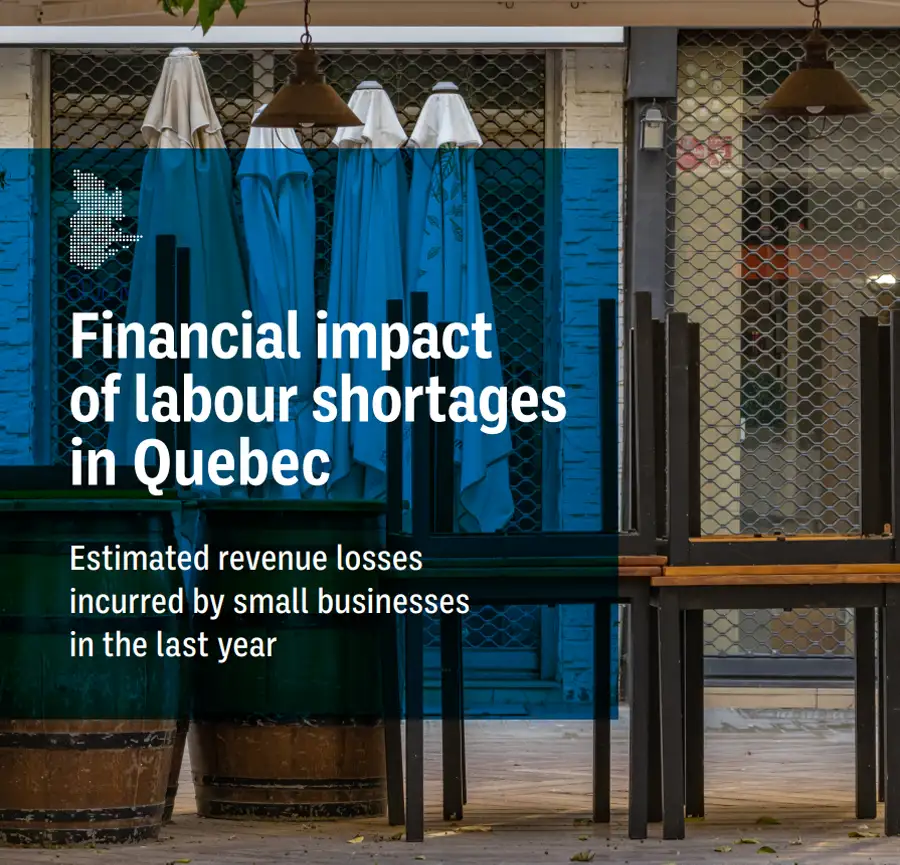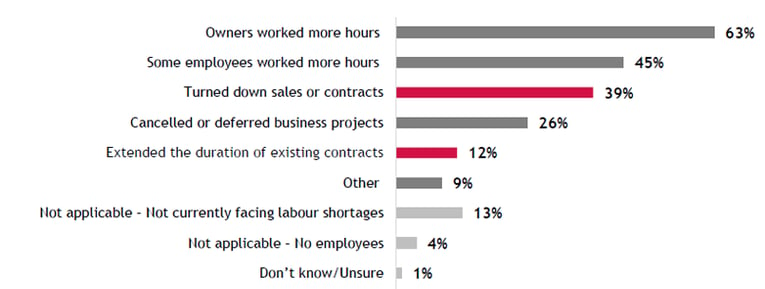
Estimated revenue losses incurred by small businesses in the last year
Introduction
Labour shortages are currently the second biggest issue facing small business (SME) owners in Quebec (86%), just after rising costs for things like energy, inputs and insurance (87%) and before government imposed costs (81%).1 . To shed light on the consequences of this situation, CFIB has decided to estimate the total losses incurred by Quebec SMEs in the last year2 due to turned down or delayed contracts caused by labour shortages. This study complements a report on the impact of labour shortages on small businesses in Quebec3 released last April.
How labour shortages affect SMEs
In this section, we will go over the various impacts and consequences of labour shortages on small business owners in Quebec. These impacts can take many shapes and can add up. In particular, labour shortages can affect the hours worked by owners and employees, slow down service and production, or cause sales or contracts to be turned down. As such, The Figure below shows that a majority of business owners (63%) had to work more hours to make up for the shortages, while 45% said that their employees had to work more hours. The third biggest impact was businesses having to turn down sales or contracts (39%), and the fourth biggest was contract delays (12%).
In the next section, we will attempt to measure the losses resulting from disrupted sales and contracts. It is important to note that the losses stemming from turned down sales and contracts can sometimes be hard to estimate (particularly in sectors where small sales or contracts are turned down more often).

Source: CFIB, Quebec Omnibus Survey — March 2022, n = 1,328.
Note: Respondents were allowed to select more than one answer choice. Percentages will not add to 100%.
Question: What impact, if any, do labour shortages currently have on your business? (Select all that apply)
Losses suffered by Quebec SMEs
Based on survey results concerning disrupted sales and contracts, CFIB was able to calculate part of the losses suffered by Quebec small business owners due to labour shortages (see the appendix for details about our methodology). As is shown in the following table, total financial losses over the last year amount to well over $10.7 billion. Notably, both the construction and professional and business services sectors suffered losses in excess of $2 billion. These amounts can be explained by: 1) the size (number of SMEs) of these sectors, 2) the high proportion of businesses having had to turn down sales or contracts in the last year, and 3) the higher proportion of losses compared to revenue. Detailed results regarding these second and third factors are displayed by sector in Table A1 of the appendix.
| Sector | Loses by sector (in $ millions) |
|---|---|
| Construction | 2,219.7 |
| Professional and Business Services | 2,078.0 |
| Wholesale and Transportation | 1,204.2 |
| Hospitality | 1,024.4 |
| Retail | 971.8 |
| Personal, Misc. Services | 893.9 |
| Manufacturing | 702.8 |
| Agriculture and Natural Resources* | 256.5 |
| Other services*, ** | 1,417.8 |
| Total | 10,769.2 |
Source: CFIB, Quebec Omnibus Survey — March 2022, n = 397.
Notes:
*Small sample, use with caution (<30).
**Other services include the social services and arts, recreation & information sectors.
While the estimated impact of labour shortages on the loss of sales and contracts is significant for small business owners, it is important to note that it does not necessarily result in the same net loss for the Quebec economy. The amounts that were not invested in these contracts or sales may have been injected into different projects or allocated to other expenses for SMEs, and the lost customers may have spent their money elsewhere in Quebec in other ways.
Nevertheless, over $10.7B could have been a major boon for businesses, allowing them to compensate for staffing shortages by investing in automation or raising wages. This loss also comes at a bad time for Quebec SMEs, as 62%4 of businesses must now repay their COVID debt ($108,000 on average),5 and only 46% of which are back to normal revenues. They are also faced with other challenges as 87% struggle with rising costs (energy, inputs) and 81% struggle with government-imposed costs.6
Conclusion
Labour shortages have impacted Quebec SMEs in many ways, including by forcing them to turn down sales and contracts. These losses have consequences that should not go unaddressed. If our approach to the labour market remains the same, the current situation could worsen in years to come.7.
SMEs are the lifeblood of Quebec’s economy. The challenges and losses they face due to labour shortages are effectively slowing their post-pandemic recovery and hampering their success.
Related Documents
| Publication date | Report | Download |
|---|---|---|
| August 2022 | Financial impact of labour shortages in Quebec – Estimated revenue losses incurred by small businesses in the last year | PDF (3.2 Mo) |
Notes:
- CFIB, Your Voice – April 2022 Survey, n = 440.
- The analysis only considers SMEs with an income range of $30,000 to $5M.
- Rapport de sondage de la FCEI : Impact de la pénurie de main-d’œuvre pour les PME du Québec,CFIB, 2022 (only available in French).
- Small Business Recovery Dashboard, https://initiative.cfib-fcei.ca/dashboard/
- Two Years of COVID-19 for Canada's Small Businesses, CFIB, 2022.
- CFIB, Your Voice – April 2022 Survey, n = 440.
- Bomal, Laure-Anna, Labour shortages are back with a vengeance, CFIB, 2021.

 Share Article
Share Article
 Print Article
Print Article
